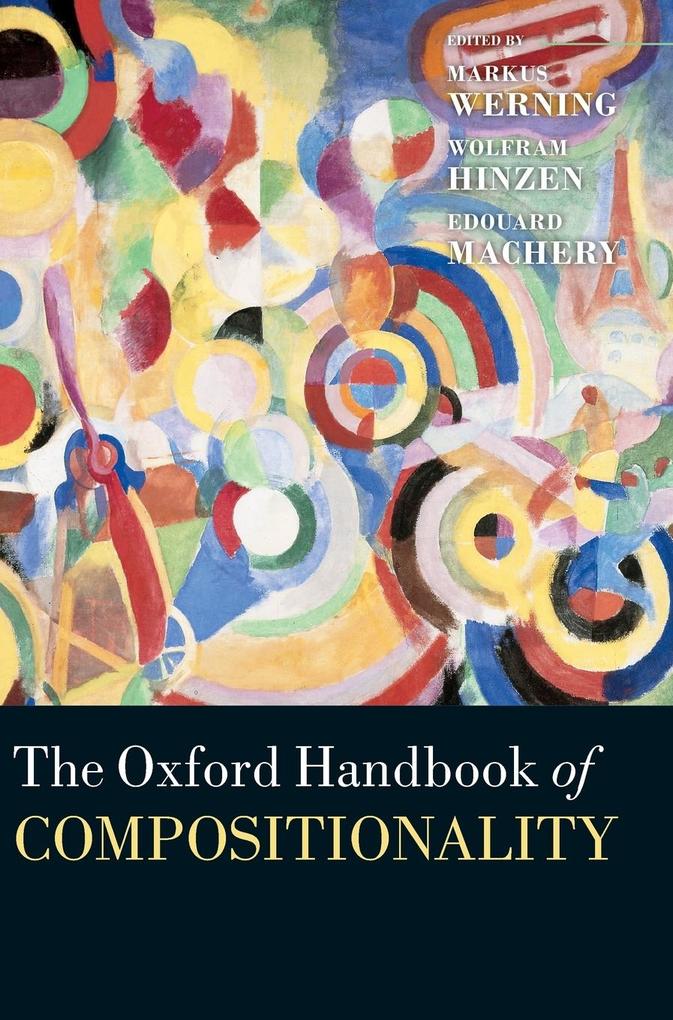
Zustellung: Mo, 18.08. - Fr, 22.08.
Versand in 2 Wochen
VersandkostenfreiLeading linguists and philosophers report on all aspects of compositionality, the notion that the meaning of an expression can be derived from its parts. This book explores every dimension of this field, reporting critically on different lines of research, revealing connections between them, and highlighting current problems and opportunities.
Inhaltsverzeichnis
- Introduction
- Part I: History and Overview
- 1: Theo Janssen: Compositionality: Its Historic Context
- 2: Marcus Kracht: Compositionality in Montague Grammar
- 3: Zoltan Szabo: The Case for Compositionality
- 4: Ede Zimmermann: Compositionality Problems and How to Solve Them
- Part II: Compositionality in Language
- 5: Sebastian Löbner: Sub-Compositionality
- 6: Pauline Jacobson: Direct Compositionality
- 7: Jeff Pelletier: Holism and Compositionality
- 8: Francois Recanati: Compositionality, Flexibility, and Context-dependence
- 9: Dag Westerstahl: Compositionality in Kaplan Style Semantics
- 10: Paul Pietroski: Semantic Monadicity with Conceptual Polyadicity
- Part III: Compositionality in Formal Semantics
- 11: Wilfrid Hodges: Formalising the Relationship Between Meaning and Syntax
- 12: Tim Fernando: Compositionality in Discourse From a Logical Perspective
- 13: Gabriel Sandu: Compositionality and the Context Principle
- Part IV: Lexical Decomposition
- 14: Dieter Wunderlich: Lexical Decomposition in Grammar
- 15: Wolfram Hinzen: Syntax in the Atom
- 16: Heidi Harley: Lexical Decomposition in Modern Syntactic Theory
- 17: James Pustejovsky: Co-compositionality
- Part V: The Compositionality of Mind
- 18: Lila Gleitman,Andrew Connolly, and Sharon L. Armstrong: Can Prototype Representations Support Composition and Decomposition?
- 19: James Hampton and Martin Jönsson: Typicality and Compositionality: The Logic of Combining Vague Concepts
- 20: Edward Wisniewski and Jing Wu: Emergency!!! Challenges to a Compositional Understanding of Noun-noun Combinations
- 21: Edouard Machery and Lisa Lederer: Simple Heuristics for Concept Combination
- 22: Jesse Prinz: Regaining Composure: A Defense of Prototype Compositionality
- Part VI: Evolutionary and Communicative Success of Compositional Structures
- 23: Gerhard Schurz: Prototypes and their Composition from an Evolutionary Point of View
- 24: Kenny Smith and Simon Kirby: Compositionality and Linguistic Evolution
- 25: Michael Arbib: Compositionality and Holophrasis: From Action and Perception Through Protolanguage to Language
- 26: Peter Pagin: Communication and the Complexity of Semantics
- Part VII: Neural Models fo Compositional Representation
- 27: Terry Horgan: Connectionism, Dynamical Cognition, and Non-Classical Compositional Representation
- 28: Martina Penke: The Dual-Mechanism Debate
- 29: Terrence Stewart and Chris Eliasmith: Compositionality and Biologically Plausible Models
- 30: Andreas K. Engel and Alexander Maye: Neural Assemblies, the Binding Problem, and Neural Synchrony
- 31: Markus Werning: Non-symbolic Compositional Representation and Its neuronal Foundation: Towards an Emulative Semantics
- 32: Giosue Baggio, Michiel van Lambalgen, and Peter Hagoort: The Processing Consequences of Compositionality
- Appendix
- References
- Index
Mehr aus dieser Reihe
Produktdetails
Erscheinungsdatum
07. April 2012
Sprache
englisch
Untertitel
Sprache: Englisch.
Seitenanzahl
766
Reihe
Oxford Handbooks
Herausgegeben von
Markus Werning, Wolfram Hinzen, Edouard Machery
Verlag/Hersteller
Produktart
gebunden
Gewicht
1461 g
Größe (L/B/H)
261/182/48 mm
ISBN
9780199541072
Entdecken Sie mehr
Pressestimmen
"The editors should be commended for also having the vision to create a forward-looking volume that highlights both current debates in the field as well as speculative theoretical questions that will likely shape and direct future research endeavors in the years to come. The editors did an excellent job of bringing together academics with various, diverse specializations to contribute to a volume with such a broad scope of coverage...this volume and its contents will undoubtedly have a high impact in various fields of language science for years to come."--Linguist List
Bewertungen
0 Bewertungen
Es wurden noch keine Bewertungen abgegeben. Schreiben Sie die erste Bewertung zu "Oxford Handbook of Compositionality" und helfen Sie damit anderen bei der Kaufentscheidung.
































